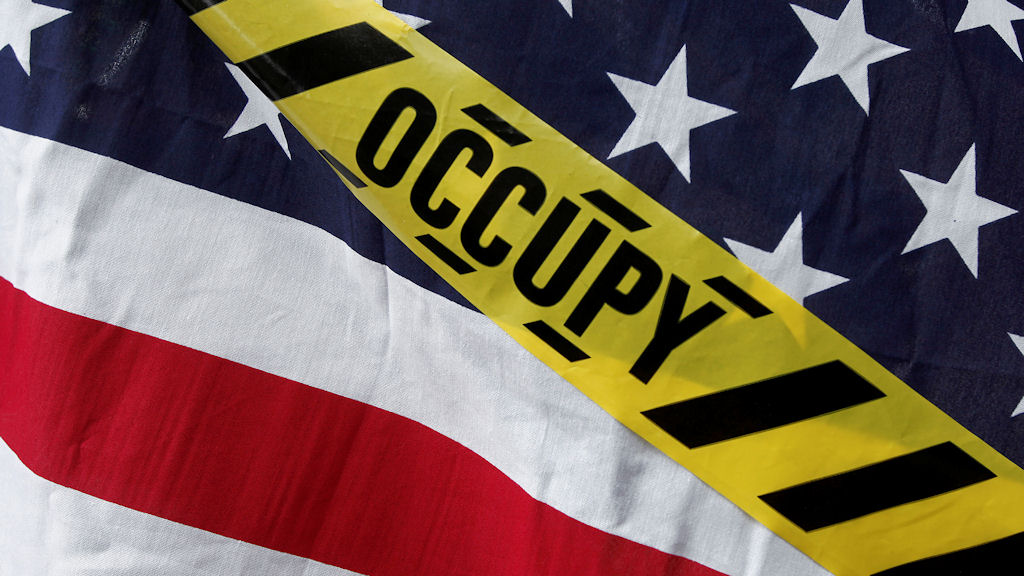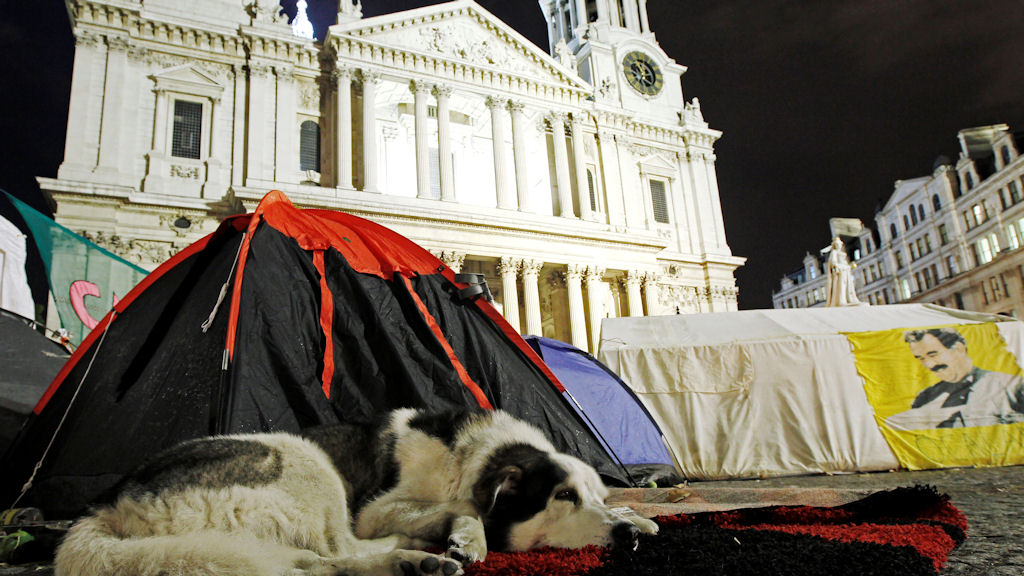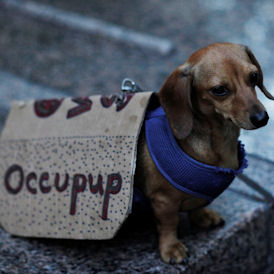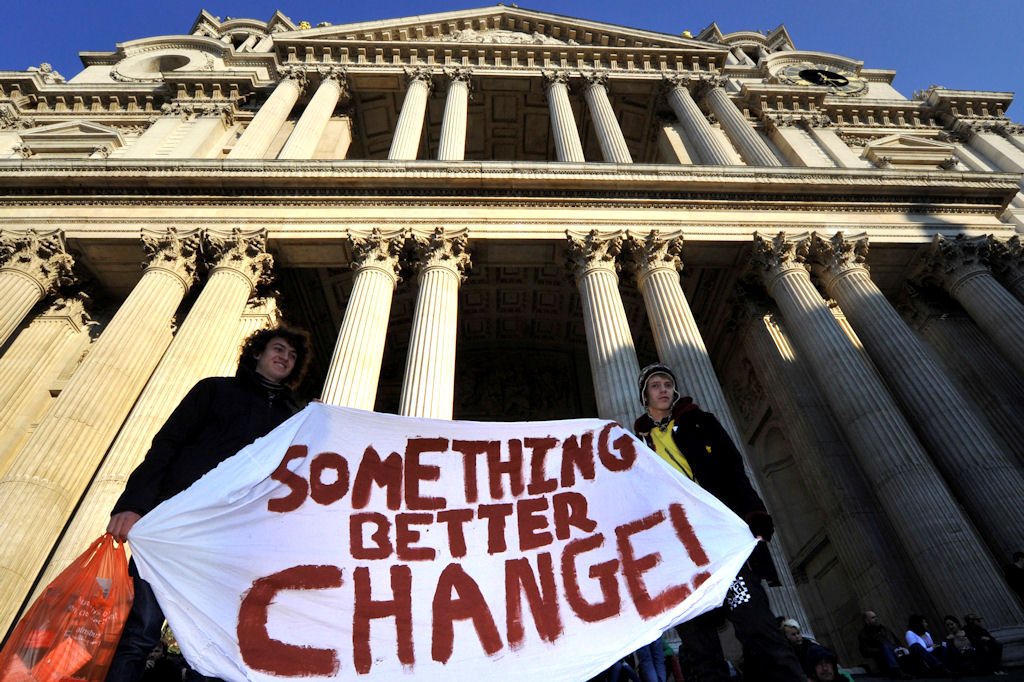What has Occupy done for us?
A year ago, activists pitched tents in New York’s Zucotti Park and the global Occupy protest movement was born. But has it actually changed anything? Channel 4 News takes a look.

It was a year ago today when tents began to spring up, like brightly-coloured canvas weeds, in New York’s Zuccoti Park. Within weeks, the weeds spread – and tent cities appeared across the globe, from London to Hong Kong, Prague to Rio.
Occupy protesters wearing V for Vendetta masks demanded an end to inequality, an end to bloated business, even an end to capitalism.
But 12 months later and the tent cities are largely gone, uprooted and evicted by the authorities. In contrast, many of the issues Occupy railed against – from inequality to bankers’ bonuses – are alive and well.
The Occupy protesters say the tents were never all that their movement was about, but what is left of them now? Have they changed the world – or even the conversation?
We didn’t just occupy a space, we occupied people’s consciousness. Spyro Limneos, Occupy London protester
Spyro Limneos was one of the original Occupy London protesters who pitched tents outside St Paul’s Cathedral in London.
“The tents were a tactic, but what is left of Occupy is not just a tactic. We can’t continue in the same way, but what we have achieved is to introduce values and ideas into the system which were not there before,” he tells Channel 4 News.

A platform
Limneos believes that Occupy’s main achievement is changing the way we talk about the current social, economic and political system – standing up for the rights of the 99 per cent to express themselves. Concrete change was never on the cards this soon, he argues.
“Occupy was like a platform that gave people a voice,” he says.
And in that sense, he believes the campaign has been a success – citing, in the last 12 months, newspapers like the Financial Times writing about capitalism in crisis, debates on executive pay even in more right-wing media and even the prime minister at Davos talking about a more ethical form of capitalism.
“Then there are practical things – think about the stakeholder revolution,” he says.
“That was right after the Occupy camps were evicted last spring – I think that was a sign that we didn’t just occupy a space, we occupied people’s consciousness and introduced some values which have been marginalised for quite a while from mainstream politics.”
His US counterpart, Linnea Palmer Paton, is an activist within Occupy Wall Street, where it all began. She backs up Limneos’s view.
“You have to change the conversation before you can get the real changes,” she tells Channel 4 News.
It’s not just Occupy campaigners themselves who believes they have played some part in bringing issues like unequal pay to the fore.
Richard Wilkinson, co-founder of The Equality Trust and co-author of The Spirit Level, agrees.
“There’s no doubt at all that it raised the profile of the issue, and although the movement itself has dissipated, I think the interest in society more widely has not diminished,” he says.
“It aroused interest in the scale of tax avoidance, tax havens, problems like that which I have no doubt will not fall off the public agenda until something is done about them.”

Wilkinson is positive that things are changing – however, he is reluctant to ascribe the whole change to Occupy.
“Occupy played an important part in raising the public profile of inequality issues. But they were also in part a reflection of that growing awareness,” he says.
It is hard not to talk – as Wilkinson and even Limneos have – about Occupy in the past tense. But it is not over: There are still practical Occupy protests going on.
Library occupation
In the UK’s Friern Barnet, Occupy has lent its name and its firepower to a group campaigning to save the local library.
Last week, the protesters reclaimed the building and opened it to the public. There have also been events over the weekend, with more expected today in the United States and elsewhere, to mark the one-year anniversary.
But in a way, at the moment at least, it seems Occupy – which began as a facilitator for public debate – is now acting as little more than a facilitator for publicity for other protests. Certainly it is now longer the notorious, challenging daily presence it was a year or so ago – either on our streets or in our heads.
I’d like to know when was this period in history when we all loved bankers. Dan Hodges
“If you asked the average person, they wouldn’t have a clue what Occupy was actually there for,” Nick Faith of the think-tank Policy Exchange says.
Many Occupy protesters believe this is a strength, allowing them to tackle various different issues. They aren’t providing solutions, they argue, just raising issues which have previously been ignored. However, as many critics – like Faith – have suggested, this does lead to a rather garbled message for the public.
“Standing up for the 99 per cent is a very sensible campaign slogan but the problem with the Occupy movement is they haven’t got a clear idea what they are standing up to. This is why we don’t think they will have any long-lasting success,” Faith says.

Other critics of Occupy are harsher, believing that even the claim to have changed the conversation is an overstatement of the movement’s achievements.
“I’d like to know when was this period in history when we all loved bankers… the shift in attitude took place the day Lehmans closed and we realised it was going to cost us billions, not when they pitched tents outside St Paul’s Cathedral,” Dan Hodges, a commentator for The Daily Telegraph and a long-term critic of Occupy, tells Channel 4 News.
He believes the movement has changed nothing.
“Having said that, it was never that apparent what they were seeking to change, and that was part of the problem. But I think I would be hard-pressed to point to anything of significance that has happened – certainly in political or social terms – that could be traced to the Occupy movement.
Wasted potential?
“To be honest, if I went into the street and said: ‘It’s the first anniversary of Occupy, have they changed the world?’
The first response would be ‘What?’ and the second would be ‘No’,” he says.
Much of the criticism of Occupy comes from a sense of disappointment, a feeling of wasted potential.
To get together a global social movement in these cynical times, to audaciously occupy capital cities across the globe, to win thousands of column inches – and then yet be unable to comprehensively point to issues on which they have “won” feels – well, like a bit of a waste; as does the movement’s lack of a strategy for their second year of existence.
Occupy campaigners themselves seem to understand this sense of disappointment. Their website: So what the heck has Occupy done so far? suggests at once a sense of insecurity and a recognition that, even if they have changed the conversation, nobody realises.
Changing the world? It’s harder than it sounds.
